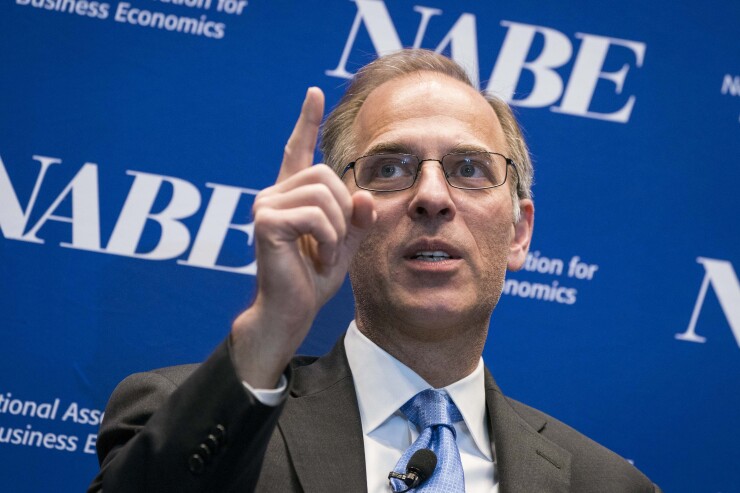Conservatives are digging in with the argument that reopening the economy is a better approach to battling the economic impact of the pandemic than a new round of federal aid to state and local governments would be.
But the National League of Cities and other groups such as Moody’s Analytics are warning that a nationwide economic recovery will be at risk of stalling if Congress fails to provide more aid.
They argue that the future course of the pandemic is uncertain and any economic recovery could be derailed by a second wave of COVID-19.
The arguments are being made while the Republican-controlled Senate continues to postpone consideration of any new federal aid as a follow up to the $1.8 trillion CARES Act enacted in late March.
Only three Senate Republicans have signed on as sponsors of the bipartisan $500 billion SMART Act and none are supporting the $3.4 trillion HEROES Act passed by the Democratic-controlled House.
“What we need to do is open the economy,” Kentucky Treasurer Allison Ball said at a recent forum sponsored by the conservative-leaning Heritage Foundation that was aptly titled “No Bailouts: State and Local Reforms to Escape Bankruptcy.”
“When you open the economy, you don't need to worry about finding money for unemployment, because people are employed,” said Ball. “And we know from experience, what that does for the future. It just stabilizes things.”
More states need to follow the examples of Texas and Florida by reopening their economies, according to Heritage Foundation Research Fellow Rachel Greszler and Vance Ginn, chief economist at the Texas Policy Foundation who formerly served in the Trump administration’s Office of Management and Budget.
“Ultimately, we don't need more bailouts,” said Ginn.
State and local government groups that have been lobbying the Senate to take action are making very little headway. The National League of Cities recently made a presentation to Republican Sen. Shelley Moore Capito of West Virginia, but she’s not yet agreed to support the SMART Act.
The NLC is targeting six to eight Republican senators to join their Democratic colleagues in supporting the SMART Act.
“We are anticipating that they are going to take action,” said Clarence Anthony, the NLC’s CEO and executive director.
A report released last week by Moody’s Analytics found the $3.4 trillion House-passed HEROES Act would help keep the nascent recovery intact if it also passes the Senate and is signed into law. The legislation includes $915 billion in direct aid to state and local governments as well as an extension of $600 a week federal unemployment benefits beyond July.

The Moody’s Analytics global model estimates the HEROES Act would boost annualized U.S. real GDP growth by 18% in the second half of this year compared to just over 5% if there is no additional fiscal support.
“Until the pandemic is over, it is difficult to see the economy experiencing the consistently
strong growth necessary to bring down unemployment significantly,” Moody’s Analytics Chief Economist Mark Zandi wrote.
Zandi cited the uncertainty over whether a second wave of the virus will strike. Even if it does not close businesses again, said it’s not known if it will be highly disruptive to businesses as scared Americans self-quarantine. Other unknowns are when an effective vaccine or effective therapy will be available and how quickly it will be distributed.
“These are all but impossible questions to answer, and they ensure that businesses and consumers will remain cautious,” Zandi wrote.
The NLC’s own survey of 1,100 members found 74% of municipalities have already started making unavoidable cuts and adjustments just to stay afloat, according to NLC President Joe Buscaino, who is president pro tempore of the Los Angeles Council.
“For others, it's simply too soon to know what spending adjustments will be needed to address the projected $360 billion revenue loss the cities will face for the next three years,” Buscaino said.
The NLC survey found 65% of cities are delaying or canceling capital expenditures and infrastructure projects;
61% are delaying or canceling equipment purchases; 24% are making significant cuts to community and economic development programs, and 13% are cutting code inspection planning and permitting.
In addition to the 1.5 million state and local government jobs already eliminated, Buscaino said 32% of cities indicate they will have to furlough or lay off additional employees.





